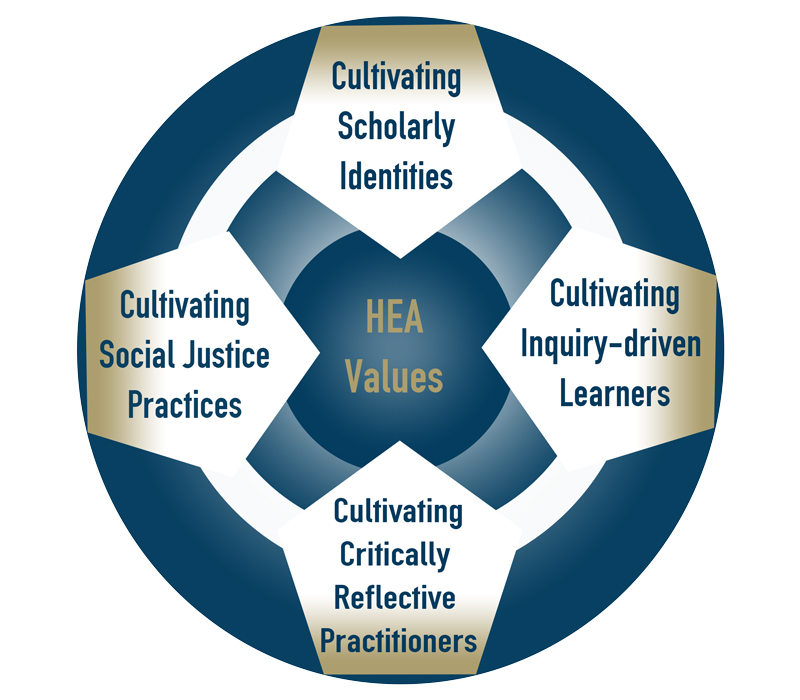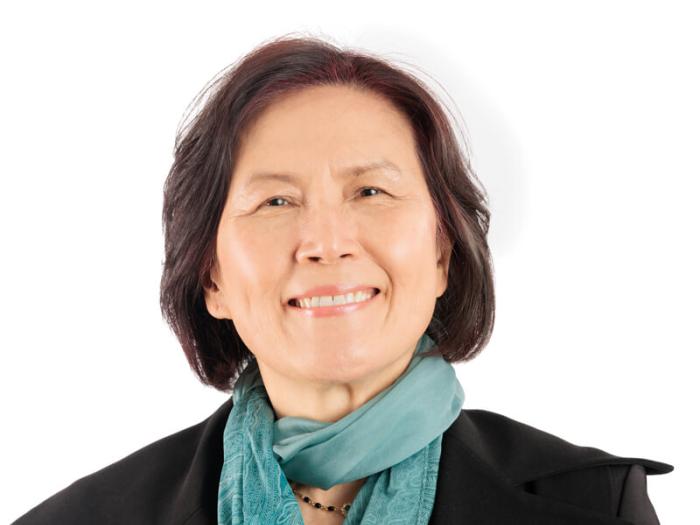GSEHD Alumna Returns to GW as Associate Vice Provost for Student Affairs


Designed for working professionals, GW’s research-focused Doctor of Education (EdD) in Higher Education Administration prepares aspiring leaders for senior and executive roles in colleges, government agencies, and higher ed organizations. Blending rigorous academic study with real-world application, the program equips scholar-practitioners with the leadership, critical inquiry, and research skills needed to address the field’s most pressing challenges and opportunities.
With a strong emphasis on equity, institutional effectiveness, and socially just practices, you’ll gain the tools to inform policy, drive strategic change, improve student outcomes, and shape the future of higher education. Taught by expert faculty, the curriculum is grounded in both theory and practice—empowering you to make an immediate impact as a critically reflective leader.

Leading Faculty & Professional Peers
Engage in learning communities that draw upon real-world experiences shared by classmates with a broad range of diverse perspectives and professional backgrounds. Faculty are hands-on and highly regarded as scholars or scholar-practitioners and experts in the field.
Convenient Schedule
In order to accommodate busy professionals who work both locally and nationally, the program offers flexible weekend classes that meet one time per month on Friday and Saturday.

Hands-On Professional Development
The program provides a high-quality, fast-paced scholarly experience in which students can integrate theory and research seamlessly with practice. Unique to GW's program, you will have the opportunity to focus your dissertation on a problem of practice you've encountered within your higher education career.
The Higher Education Administration doctoral program leverages our location in Washington, D.C. - the epicenter of policy, practice, and research - to foster a community of scholar-practitioners, professional and research opportunities, and a commitment to diverse educational experiences.
Our location also provides students with the distinct advantage of being a neighbor to national organizations, including The Department of Education, American Council on Education, ACPA and NASPA, American Educational Research Association, and a variation of colleges, creating valuable networking and career opportunities.
Doctor of Education (EdD) in the Field of Higher Education Administration
Educational Leadership
Foggy Bottom Campus
Fall
8-12

The mission of the Higher Education Administration (HEA) program is to prepare exceptional leaders for administrative, academic, and research positions in two- and four-year higher education institutions, national and international associations, government agencies, and other post-secondary educational settings.
Our doctoral program seeks to cultivate scholarly identities, inquiry-driven learners, critically reflective practitioners, and socially just practices.
Scholarly Identities: Scholarly identity is the product of your training, areas of expertise, methodological inclination, interests, publications, research agenda, reputation and anything else that may be important in your field. Thus, your scholarly identity is multifaceted and (ideally) signals to anyone who researches your work (googles you), what you have done, what you are doing and what you can potentially do in the future.
Inquiry-Driven Learner: An inquiry-based learning approach lets students share their own ideas and questions about a topic. This helps foster more curiosity about the material and teaches skills students can use to continue exploring topics they are interested in. Rather than simply memorizing facts, students make their own connections about what they are learning that leads to asking questions, making discoveries, and testing those discoveries in the search for new understanding.
Critically Reflective Practitioner: someone who, at regular intervals, looks back at the work they do, and the work process, and considers how they can improve. They ‘reflect’ on the work they have done.
Social Justice Practices: Social justice in education refers to a commitment to challenging social, cultural, and economic inequalities imposed on individuals arising from any differential distribution of power, resources, and privilege. According to NASPA, The social justice competency is defined as “both a process and a goal which includes the knowledge, skills, and dispositions needed to create learning environments that foster equitable participation of all groups while seeking to address and acknowledge issues of oppression, privilege, and power." We undergird this competency within our course frameworks, and our dispositions.
Learn more about Promoting Diversity and Inclusion in Higher Education Administration >
The following requirements must be fulfilled: A minimum of 53 credits and successful completion of a comprehensive examination.
| Code | Title |
|---|---|
| Required | |
| EDUC 8505 | Seminar: Higher Education Administration |
| EDUC 8510 | Administration and Organization of Higher Education |
| EDUC 8520 | Theories for Research on College Students |
| EDUC 8525 | College and University Curriculum |
| EDUC 8530 | Leadership in Higher Education |
| EDUC 8555 | Policy Analysis in Higher Education |
| EDUC 8566 | Higher Education Finance |
| Electives | |
| 6 credits selected in consultation with advisor | |
| Research | |
| EDUC 8120 | Group Comparison Designs and Analyses |
| EDUC 8122 | Qualitative Research Methods |
| 3 credits of Level B Research Methods coursework in consultation with advisor. | |
| Dissertation | |
| EDUC 8280 | Critical Review of Educational Leadership Literature |
| EDUC 8998 | Pre-Dissertation Seminar (taken for 3 credits) |
| EDUC 8999 | Dissertation Research (minimum 12 credits needed to complete requirement) |
| An approved dissertation proposal is required. | |
| Comprehensive Examination | |
| Successful completion of a comprehensive examination is required. | |
Cohorts will meet in-person on the Foggy Bottom Campus (specific location to be shared in advance), on the following dates.
Session Times: 8:10 am-12:00 noon; 1:10 pm-5:00 pm
Summer 2025
Cohorts will meet in-person on the Foggy Bottom Campus (specific location to be shared in advance), on the following dates.
Session Times: 8:10 am-12:00 noon; 1:10 pm-5:00 pm
Fall 2025
Spring 2026
Summer 2026
As the highest level of academic achievement, our doctorate in higher education administration is designed to produce scholars and experts in the field. Program outcomes include:
Critical Thinking and Analysis: Students will learn to critically evaluate existing research, identify gaps in knowledge, and develop research questions that address those gaps.
Advanced Research Skills: Students will understand research methodologies specific to their field. They will be able to design and conduct original research and analyze and interpret complex data.
Original Contribution to Knowledge: Doctoral candidates are expected to make an original and significant contribution to the existing body of knowledge in their field through the completion of a doctoral dissertation.
Independent Scholarship: Doctoral candidates are expected to demonstrate the ability to work independently and autonomously. They will become capable of conducting research with minimal supervision, managing their time and resources effectively, and making informed decisions about their research direction.
Scholarly Expertise: Program graduates should acquire an in-depth and comprehensive understanding of existing theories, concepts, and research within their area of study, developing into subject matter experts.
Effective Communication: Candidates will increase their communication skills to effectively convey complex ideas and research findings through scholarly articles, conference presentations, and engaging in intellectual discourse within the academic community.
Teaching and Mentoring: Through hands-on experiential learning opportunities, students will acquire pedagogical, supervisory, and mentorship skills, as well as learn to deliver lectures.
Leadership and Professional Development: Students acquire the ability to lead research teams, collaborate with colleagues, and contribute to the advancement of their field beyond their own research.
Ethical Conduct: As doctoral candidates are expected to adhere to high ethical standards in their research and professional conduct, participants gain a deep understanding of how to demonstrate integrity, respect for intellectual property, and awareness of ethical considerations related to human subjects or other ethical concerns specific to their field.
GSEHD’s Office of Admissions invites you to apply for a spot in our program. Please review the following admission and financial information.
Ready to take the next step in your career? Review our step-by-step guide to applying to GSEHD >
To learn more about the program, admission process, and upcoming events, please connect with the GSEHD Admissions Team at askdel![]() gwu [dot] edu (askdel[at]gwu[dot]edu) or 202-994-9283.
gwu [dot] edu (askdel[at]gwu[dot]edu) or 202-994-9283.
| Apply Now | Schedule Meeting with Admissions Coach |
To be considered for admission, applicants must submit the online application form as well as the following required supporting documents. There is no application fee.
*Additional application requirements may exist for international applicants.
Applications are now being accepted for Fall 2026. We encourage you to apply as early as possible.
| Application Timeline | Fall |
|---|---|
| Priority Deadline | Nov 1 |
| Round 1 Deadline | Dec 1 |
| Round 2 Deadline | Jan 15 |
| Round 3 Deadline | March 1 |
| Round 4 Deadline | May 1 |
For more information or to inquire about the next admissions cycle, contact the GSEHD Admissions Team at askdel![]() gwu [dot] edu (askdel[at]gwu[dot]edu) or 202-994-9283.
gwu [dot] edu (askdel[at]gwu[dot]edu) or 202-994-9283.
We know embarking upon graduate school is a big decision - due in part to the costs of attending. At GW, we understand the time and thought behind making graduate school work for you. Please take a moment to learn more about the options and opportunities available to help fund your graduate education.
Graduate tuition is charged per credit hour, unless otherwise noted. Rates vary by program and location.
The tuition rate* for the on-campus EdD in HEA program is $1,960 per credit hour.
This program requires 53 credits.
Please note: Additional fees may apply for international students, late fees, etc. Current tuition rates may be updated during the year.
*Summer 2025, Fall 2025 and Spring 2026
Scholarships are available to eligible admitted students. Review eligibility requirements and learn more about funding your education >


What I have learned continues to allow me to support and educate our future leaders, citizens, and movement builders during their college years. Furthermore, my applied knowledge and education has given me the confidence to lead complex organizations and advise colleagues at the most senior levels including university presidents, chancellors, and governing boards.
DAVID SURRATT
Vice President for Student Affairs and Dean of Students, University of Oklahoma
The ever-evolving field of higher education requires exceptional leaders for administrative, academic, and research positions on college campuses, national associations, and government agencies.
Our graduates are transforming the conversation and quality of experience at higher education institutions and organizations nation-wide. 60% of program graduates serve in roles of provost, board of trustees member, or tenure leadership.

The career paths you can take in this field are as vast and diverse as the world of higher education itself. For example,
Meet a few of our recent alumni:

Students interested in pursuing this degree find positions within:





Assistant Professor, Higher Education Administration; Director of Diversity, Equity, and Inclusion Initiatives
